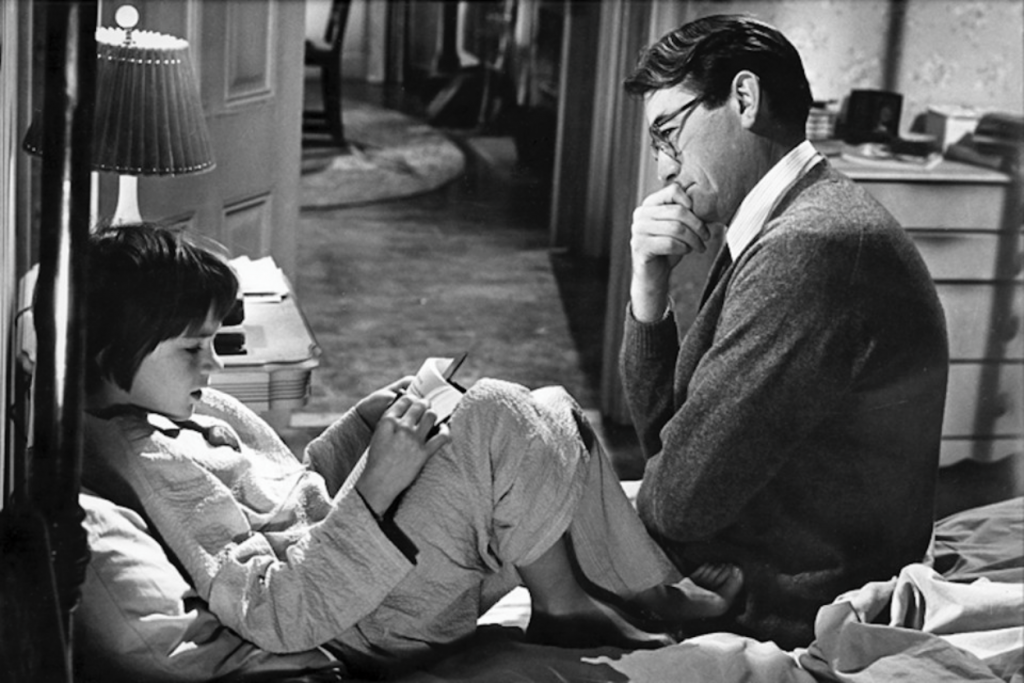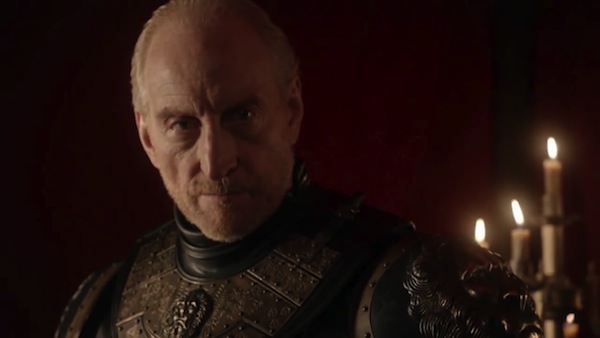Literary Dads: A Quirk Report Card
[Movie still from To Kill a Mockingbird 1962, Universal Pictures]
Ah, Father’s Day…that second-fiddle after-thought of the greeting card holidays. According to a prominent bank, America spends 40% more money on Mother’s Day. That’s an average of $57 dollars less on Dad than on Mom, and the gap has been widening since 2003.
Your friends here at Quirk understand. Everyone has their reasons for snubbing Dad (to a much less extent).
Maybe a stroll through grades for the good, bad and downright deadly of literary dads will give you some perspective this Father’s Day. Maybe even inspire you to ditch the necktie and get Dad something that says, “I love you just as much as I love Mom.”
[Movie still from The Road, 2929 Productions and Dimension Films]
I BROUGHT YOU INTO THIS WORLD, AND THIS WORLD SUCKS
The Man: The Road by Cormac McCarthy (2006)
Dad Grade: A+
Key Dad Line: “The boy lay with his head in the man's lap. After a while he said: They're going to kill those people, aren't they?
[The Man:] Yes.
[The Boy:] Why do they have to do that?
[The Man:] I don’t know.
[The Boy:] Are they going to eat them?
[The Man:] I don’t know.
[The Boy:] They're going to eat them, aren’t they?
[The Man:] Yes.
[The Boy:] And we couldn’t help them because then they'd eat us too.
[The Man:] Yes.
[The Boy:] And that's why we couldn’t help them.
[The Man:] Yes.
[The Boy:] Okay.”
The Man, also referred to as Papa or The Father, makes every single imaginable Dad sacrifice ever invented. Over the course of McCarthy’s post-apocalyptic masterpiece, he takes a life, gives his life, and starves himself…all in the name of fatherly love.
The Man provides the pragmatic, principled survival strategy by which his son’s idealistic morality is vetted. In other words, he embodies fatherhood at the most basic, primal level, thereby becoming one of the most visceral, elevated examples of it ever committed to literature.
We defy any father to get through this novel with a dry eye.
[Movie still from To Kill a Mockingbird 1962, Universal Pictures]
THE GREAT DADSPLAINER:
Atticus Finch: To Kill A Mockingbird by Harper Lee (1960)
Dad rating: A-
Key Dad Line: “I wanted you to see what real courage is, instead of getting the idea that courage is a man with a gun in his hand. It's when you know you're licked before you begin, but you begin anyway and see it through no matter what.”
Google “Best Dad,” and literally, a picture of Gregory Peck as Atticus Finch will pop up. Atticus is the LeBron of literary dads, for sure, and for good reason. Lee’s character, based on her own father Amasa Coleman Lee, makes a “proud and lonely stand” against racial oppression in a small, Southern town, all while compassionately single-parenting his son and narrator daughter.
Atticus became America’s Dad of choice by extolling heaping helpings of maxim-dripping, rabid-dog-sharp-shooting, moral uprightness.
Yet, like any perennial favorite, Atticus has his scandals and critics. Malcolm Gladwell debates the character’s merits as a civil rights activist. In Go Set A Watchman, Lee’s panned follow-up to Mockingbird, Atticus is depicted as (among other things) a “racial segregationist, wistfulness for the vanquished Confederacy and a strict brand of conservatism,” according to the New York Post.
But chinks in Atticus's “dad armor” are visible in the source text as well. In Mockingbird, Atticus scoffs to his daughter about the eventual possibility of female jurors. He leaves house-keeper Calpurnia to raise his kids while he reads the evening paper. And, he seems to base his entire (failed) defense of Tom Robinson, not on Tom’s actual character, but his own honor as a member of the community.
Civil rights visionary: maybe. Complicated purveyor of white savior complex: more likely. The “perfect American dad?” Haven’t we learned that lesson, already?

[Movie still from Harry Potter and the Chamber of Secrets, Warner Bros]
NOT AS BAD AS YOU REMEMBER: NERVOUS BREAKDOWN VERSION
Vernon Dursley, Harry Potter series by J.K. Rowling (1997 – 2007)
Dad Grade: B-
Key Dad Line: “There’s no such thing as magic. He will not be going, I tell you. We swore when we took him in, we’d put an end to all this rubbish!”
For those who know Harry Potter only from the films (and none of those people read this blog), Vernon Dursley’s inclusion may seem a surprise. For Potter fanatics (aka “our people”) who read the backstories published by Rowling on the Pottermore website, this makes a bit more sense.
Rowling’s backstory describes an encounter in which James Potter (Harry’s pompous, brash, and sometimes cruel dad) is smug and impatient with Vernon. In turn, Mr. Dursley becomes the first, but certainly not the last, (ahem! Team Snape) character to misdirect hostility upon young Harry.
An even more compelling argument for the Dursleys comes from the Harvard Divinty graduate students behind Harry Potter as Sacred Text. They contend that Petunia Dursley (Harry’s aunt and foster mother) was at best ignored, and at worst belittled by her own family and magical sister. They argue that this treatment of Petunia motivates Vernon to protect and honor his own wife and son at all costs.
Sure, Vernon may spoil his son and binge-eat ice cream right out of the freezer, but try to imagine a life playing second fiddle to magical siblings, then one night, magic is literally dropped at your doorstep.
Go ahead, re-read Philosopher’s Stone, and you may find yourself sympathetic to Vernon Dursley’s paternal angst.
[TV still from The Shining 1997, Warner Bros Television and Lakeside Productions]
NOT AS BAD AS YOU REMEMBER: HOMICIDAL BREAKDOWN VERSION
Jack Torrance, The Shining by Stephen King (1977)
Dad Grade: D+
Key Dad Line: “Dear God, (I) could use a drink. Or a thousand of them.”
Ok. Ok. Hear me out, ok?
This Jack Torrance is NOT the Jack Nicholson Jack Torrance. Nope. He’s total dad fail–him and his creeper eyebrows.
But in King’s novel, Torrance, is actually likable. Arguably sympathetic. Yes, he’s an alcoholic. Yes, he accidentally broke his own son’s arm. But a major chunk of the novel is devoted to his guilt, self-hatred and genuine drive to better himself.
At the end of the novel, Jack Torrance even sacrifices himself to save his family and destroy the Overlook Hotel. Novel Jack loves his family, and he wants to be better. It’s not his fault that the road to self-improvement takes him headlong into a demonic, haunted hotel that turns him into an axe-wielding homicidal maniac. It could happen to anyone.

[Movie still from Matilda, TriStar Pictures and Sony Pictures]
The Unforgivable Sin
Harry Wormwood, Matilda by Roald Dahl
Dad Grade: F
Key Dad Line: “The library? What’s wrong with the telly, for heaven’s sake.”
If you want to chase us around with an axe, you better pack a lunch, because we do cardio. You want to lock us under the stairs with no wifi password, no problem, we’re crafty. You want to force us to confront racism or cannibals or racist cannibals…we’re resilient. We may still make you a macaroni picture frame or homemade card this Father’s Day.
But what we at Quirk Books WILL NOT, we repeat, WILL NOT tolerate is book destruction– especially a beautiful book from our local public library.
Miss Honey was right, Mr. Wormwood, you are “useless, used car salesman scum.” And Quirk Book’s Worst. Dad. Ever.

Joe Costal
Joe Costal knows too much about stupid Halloween songs. His writing has appeared in dozens of magazines and journals, most recently Philadelphia Stories and The Maine Review. His poetry is included in Challenges for the Delusional II by Diode Editions. An excerpt from his novel is forthcoming in Painted Bride. Joe teaches writing at Stockton University. Visit him online at joecostal.com.



